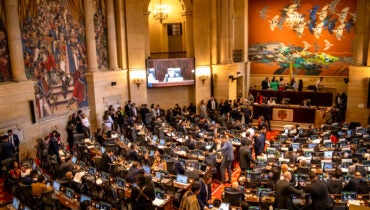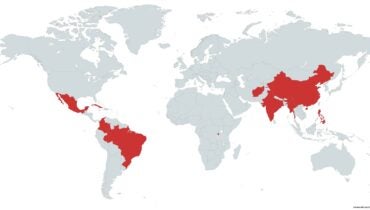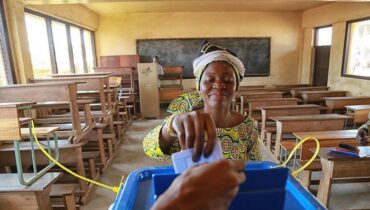Newly elected President Emmanuel Macron of France unveiled his gender-balanced cabinet this week: 11 of the 22 posts are filled by women. Macron follows his predecessor, François Hollande, in appointing high numbers of women officials. Only six countries world-wide have 50% or more women in ministerial positions. In 2016, France ranked first in the world with 52.9% women cabinet ministers, alongside Bulgaria and Nicaragua, and followed closely by Canada, Sweden and Slovenia.
France’s commitment to cabinet parity is worthy of celebration, but it’s also important to note which portfolios are given to women ministers. Data from the Inter-Parliamentary Union shows that when women are appointed to cabinet-level posts, they are overwhelmingly confined to posts that oversee social issues, often seen as “women’s issues.” Of the varied portfolios held by women across 186 countries in 2016, over half were Environment (108), Social Affairs (102), Family/Children/Youth/Elderly (98), Women’s Affairs (68), Education (67), and Culture (65). Far fewer women served as Ministers for Justice (38), Home Affairs (34), Finance (19), Economy (19), or Defense or Veterans Affairs Ministers (15).
The new French cabinet follows this pattern, with 4 of the 5 most senior portfolios managed by men. The only notable exception is France’s new Minister of Defense, Sylvie Goulard. Goulard raises the global tally of women defense ministers to 16. With her appointment, there are now 9 European women in this role – up from only 4 in 2013 – from the Netherlands, Norway, Albania, Germany, Italy, Slovenia, Bosnia and Herzegovina, Spain, and France. Other countries around the world with women defense ministers are South Africa, Kenya, Nicaragua, Australia, Japan, and Guinea Bissau [1]. All of the women currently serving have been appointed within the last 5 years. Prior to 2000, only 10 countries had ever had a female defense minister, and 5 were cases where a female prime minister also maintained the defense portfolio.
The rising numbers of women appointed to defense ministries is encouraging, since women’s leadership in the security sector continues to lag. A new report from CNAS traced these trends in the United States, where there has never been a woman secretary of defense. Though they found increasing representation of women in national security departments and agencies, it is not yet reflected in top-level leadership. Commitment at the highest level to women’s leadership in the security sector – such as by appointing a woman defense minister – recognizes the work women are already doing in national and international security, and will open paths for more women to follow. Furthermore, “hard” portfolios like defense are often a stepping stone to greater power. For instance, Michele Bachelet served as Chile’s Minister for Defense from 2002 to 2004 before being elected president in 2006.
Sylvie Goulard’s appointment reinforces a trend in Europe, which has seen the number of women defense ministers more than double in four years. Globally, there are many more female ministers of foreign affairs than defense (58 to 15) but in Europe, where the foreign affairs portfolio tends to have more clout and funding, these numbers are reversed. Though 9 of the world’s 16 female defense ministers come from Europe, there are only 2 female ministers of foreign affairs out of 47 currently serving in the region. This appears to confirm that women ministers still struggle to access the most prestigious posts.
Women defense ministers are still part of an elite club, but each new member will help to change the face of security leadership, and bring more diverse viewpoints and experiences to the business of war and peace.
[1] In Bangladesh Prime Minister Sheikh Hassina also manages the Defense Ministry, bringing the global total to 16 women with the Defense portfolio.
About the Author
Rebecca Turkington is a Program Manager at the Georgetown Institute for Women, Peace and Security. She holds a BA in International Relations/History from Wellesley College, and is currently pursuing a MA in Security Studies at Georgetown University, concentrating in terrorism and substate violence. Prior to joining the Institute in 2013, she worked on women’s political participation at the National Democratic Institute, the Women in Public Service Project and Moroccan Ministry of Interior.


